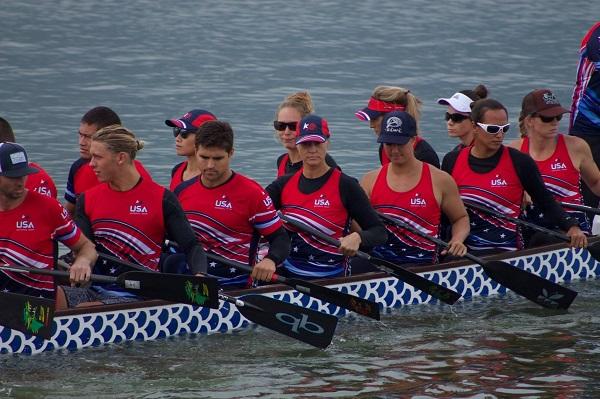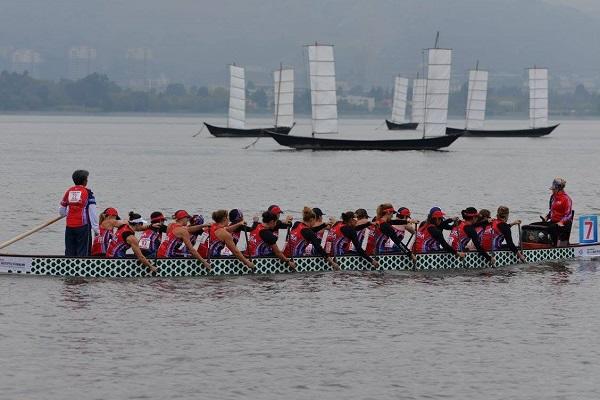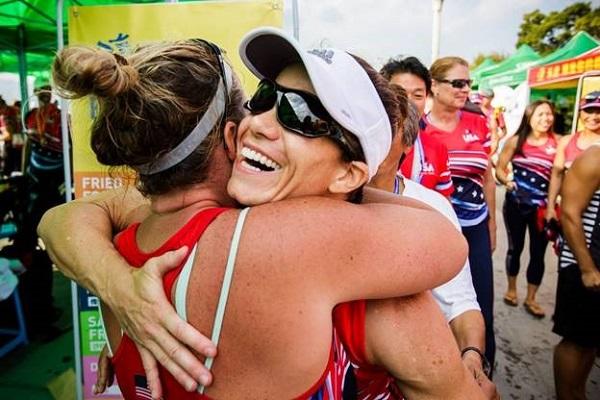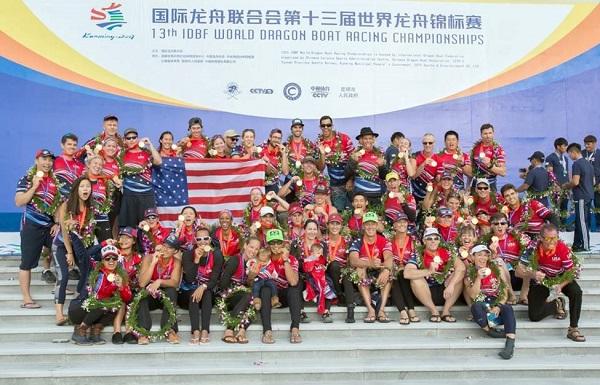By Megan Roberts, Community Engagement Program Manager at the Asthma and Allergy Foundation of America
This post is a follow up to Breathing in the Boat: Dragon Boat World Championships With Asthma and Breathing in the Boat: The Turnaround Point.
On Oct. 14, 2017, I began my travel across the world to compete at the 13th International Dragon Boat Federation’s Nations World Championships on Dianchi Lake in Kunming, China, after a long and unlikely journey to overcome asthma symptoms that nearly prevented me from competing at all.
The Saturday of my departure, I took an early flight from Philadelphia to Los Angeles, where I met teammates for two practices before flying out again that night for Kunming. It was critical to blend as a crew over that short time. We’d be competing against some teams who had trained together full time for the year leading up to competition. We came from all over the United States, with differing styles. From the last seat in the boat, I could see we had our work cut out for us. Our strength would have to make up for our lack of refinement.
We made it to Kunming midday on Monday. As we circled the race site of Dianchi Lake before our descent, you could see the neon-green hue of the water from toxic algae growth, but also the postcard-perfect mountainous backdrop surrounding the lake. After landing, we had a few hours to check into our hotel and get to the race venue for our first on-site practice.
This would be my first test of how well I’d be able to breathe during exertion at more than 6,200 feet above sea level. I was so nervous! I was more worried about breathing than I was about any other aspect of the trip, including the long flights, the possibility of getting sick and a week of exposure to the highly polluted Dianchi Lake.
It was chilly and raining lightly when we arrived at the race site. We dropped our stuff in the team tents that would be our homes for the next seven days and loaded the boats for practice.
The practice was brief. We were conserving for race days. Even so, I noticed I was breathing much harder than I should be. My heart rate was elevated much longer than normal. Ugh, I thought, I wonder how everyone else is feeling.
When our two practice days ended and we celebrated the coming race days with a beautiful, culturally rich opening ceremony, I still didn’t know how my performance would be affected by the altitude or whether it would trigger asthma symptoms. There was no question the altitude would affect performance in general. The question was: could we outperform everyone else affected by it?
We answered that question on the first race day. It was raining and cold again. This was the longest distance race of the week: the 2000 meter. This is a pursuit-style race with the fastest ranked boats starting last, hunting down the slower-ranked boats ahead while completing two 1000-meter loops. This distance is the most dramatic. There are three turns to execute, collisions and capsizes happen, and boats mercilessly ride each other’s wake. There are no heats. You just get one shot to run your perfect race plan and secure gold. The Premier Mixed 2000 meter was scheduled for late morning, followed by the Premier Women’s race in the afternoon. Like the women’s crew, the mixed crew had almost no experience paddling together before our first race as a national team. We needed to blend well right off the start.

Team USA exploded off the start line next to last in order, with only Canada behind us. Our boat was flying down the straightaway, gaining ground on the Chinese team ahead already in the first 500 meters. Coming out of the second turn, the altitude hit us like a concrete wall.
I felt a sudden, significant power drop. The boat actually dropped lower into the water with the decrease in power. We’re done, I thought. I had never experienced that before in a world-championship-level race. There’s no way we could still be in medal contention. Or was there?
At the halfway point in any 2000-meter race, you are fighting your hardest to stay at the same intensity. You have to squash the doubts screaming at you. The blood is sucked out of your face, your gut is threatening to revolt, your muscles are on fire, you are working hard just to breathe. It hurts.
So, in some ways this race was no different, except we were all more oxygen starved. The drummer, feeling the lag in the boat, motivated us through that painful stretch with tough love. “I know it hurts! Suck it up! This is the world championships!”
Coming out of the last turn, we could see the finish buoy up ahead. The energy of the first 500 meters returned as we surged to our finish. As we crossed the line, our steerer, Billy, announced, “I think we had ‘em.” But we had no way of knowing for sure until the results were posted.
Minutes later, pandemonium erupted in our team tent as we heard the news. We had won by a margin of .5 seconds. Gold. The altitude seemed to have affected our competitors, too. So far, its affects didn’t seem noticeably worse for those with asthma, I noticed, relieved.
We collected our medals in the pouring rain and ran back to our team bus to warm up before our second race.
By the second 2000, my body was already adapting. The women’s crew never hit a wall, but Thailand rode our wake for an entire straightaway and we finished second. It was an unexpectedly successful first day of racing nonetheless. We left tired but ready to come back and race our hearts out again on day two with the 1000 meter.
The next day was going to be challenging, with up to six races of the hardest distance in dragon boating. The 1000-meter course is a straight line that stretches forever. Teams that finished first in their preliminary heat progressed directly to the finals. Neither the mixed nor women’s crews managed to do that, though. We would have to race a semi-final to qualify for the final and would have much less rest. Also, unlike some competitors, the U.S. team rosters the same athletes for the women’s and men’s boats that are racing on the mixed crews. After winning the bronze with the mixed team midday, we still had three races left to complete with the women. Meanwhile, we watched fresh crews of our competitors file into the race venue.
I was exhausted by the time we got to that sixth race. I had not eaten much since dawn and had been struggling to keep warm and dry since then. Although I’d followed my asthma treatment plan religiously through the race week, the athlete village was crowded and offered no open spaces for the warm-up my lungs needed. It was also filled with secondhand smoke, mainly from military personnel who were stationed everywhere. These challenges were added to the cumulative effect of completing so many races in thin mountain air. We would all need to dig deep to produce a winning effort when we got down to that start line. I owed it to myself, my crew, my family and friends back home watching on Chinese national television in the middle of the night. I just hoped my lungs wouldn’t betray me. Like it had been for every other race, my inhaler was tucked under my jersey just in case.
As the women silently paddled down to the start line for the final time that day and waited anxiously for the race to start, an excited murmur passed through the boat. The sun had just broken through the clouds and there was a beautiful, distinct ray of light shining down on the race course. It was precisely hitting the start dock of Lane 5. That was our lane assignment!
We needed to believe it was a sign of what we could achieve. What clearer direction could the universe provide?
We lined up somberly and waited for the announcements in Chinese. As the horn blared, we exploded out of the start with fast strokes, then settled into a long, powerful pound we’d maintain down the course. We weren’t first off the line; we weren’t even second. But we hammered away patiently. In my peripheral vision, I could see us creeping up to top competitors, China and Canada. About halfway through the race, our drummer said the unthinkable into her headset, “You have two seats on Canada. Four seats on China.”
What? I thought to myself. How could we be ahead? Can we maintain it?
Both of our competitors have a wicked sprint finish, and our women’s crew had never won first in a straight distance race before. Ever. We would need a healthy lead going into the finish to hang on to the gold. Everyone in that boat knew exactly what we were up against.

There are no standouts in the sport of dragon boating. There is no individual performance report after a race is done. You just have to work your hardest and trust that everyone else around you will do the same. We had trained for months, sacrificed our time, money and time off, and traveled halfway around the world. Some of us had been racing for years without knowing gold. Many of us would never have the opportunity again. We collectively sacrificed a lot just to get to the start line, so what came after that was not just a race. It was a measure of who we are.
Time seemed to have stopped in that last few hundred meters. The edges of my vision were starting to close in. My legs were turning to lead. Finally, the drummer called us up to sprint to the finish. We poured everything we had left into the water of Lane 5 and hoped it would be enough.
The Chinese and Canadian women made up ground but not quite enough to take our gold. We held on by three-tenths of a second. The horn blasted. As soon as the crew started to catch their breath, the boat was filled with emotion, disbelief, teary eyes, sweaty hugs, patting each other’s knees and backs, and more gasping for air.

We paddled slowly into the dock and peeled ourselves out of the boat. Our premier men, having just witnessed their female teammates make history from the start line, started their own race. Reinvigorated, we ran down the course and screamed breathlessly as they crossed the finish line first themselves.
The week sprinted forward. It always goes so fast (unless you’re racing). We medaled three more times. Team USA made history that week, in a stunning race venue, in the country that was the birthplace of our sport. As the race week drew to a close, I caught up with acquaintances from around the world I only see every two years at this event – trading shirts, pictures, high fives, laughs and congratulations.
I departed Kunming with a fresh reminder that the world is a smaller, friendlier place than the news makes it often seem. I learned the Chinese culture is incredibly hospitable. One night at a local restaurant, our group was treated to dinner by the next table. And finally, I had answered my doubts about my own asthma. It took months of medication tweaking and setbacks and behavioral adjustments. But in the end, I had figured out how to breathe in the boat, and win, at the 13th Dragon Boat World Championships.

 Megan Roberts is the Community Engagement Program Manager at the Asthma and Allergy Foundation of America. She manages exercised-induced bronchoconstriction and allergies, but still spends most of her free time paddling or as a dragon boat coach.
Megan Roberts is the Community Engagement Program Manager at the Asthma and Allergy Foundation of America. She manages exercised-induced bronchoconstriction and allergies, but still spends most of her free time paddling or as a dragon boat coach.





Comments (4)